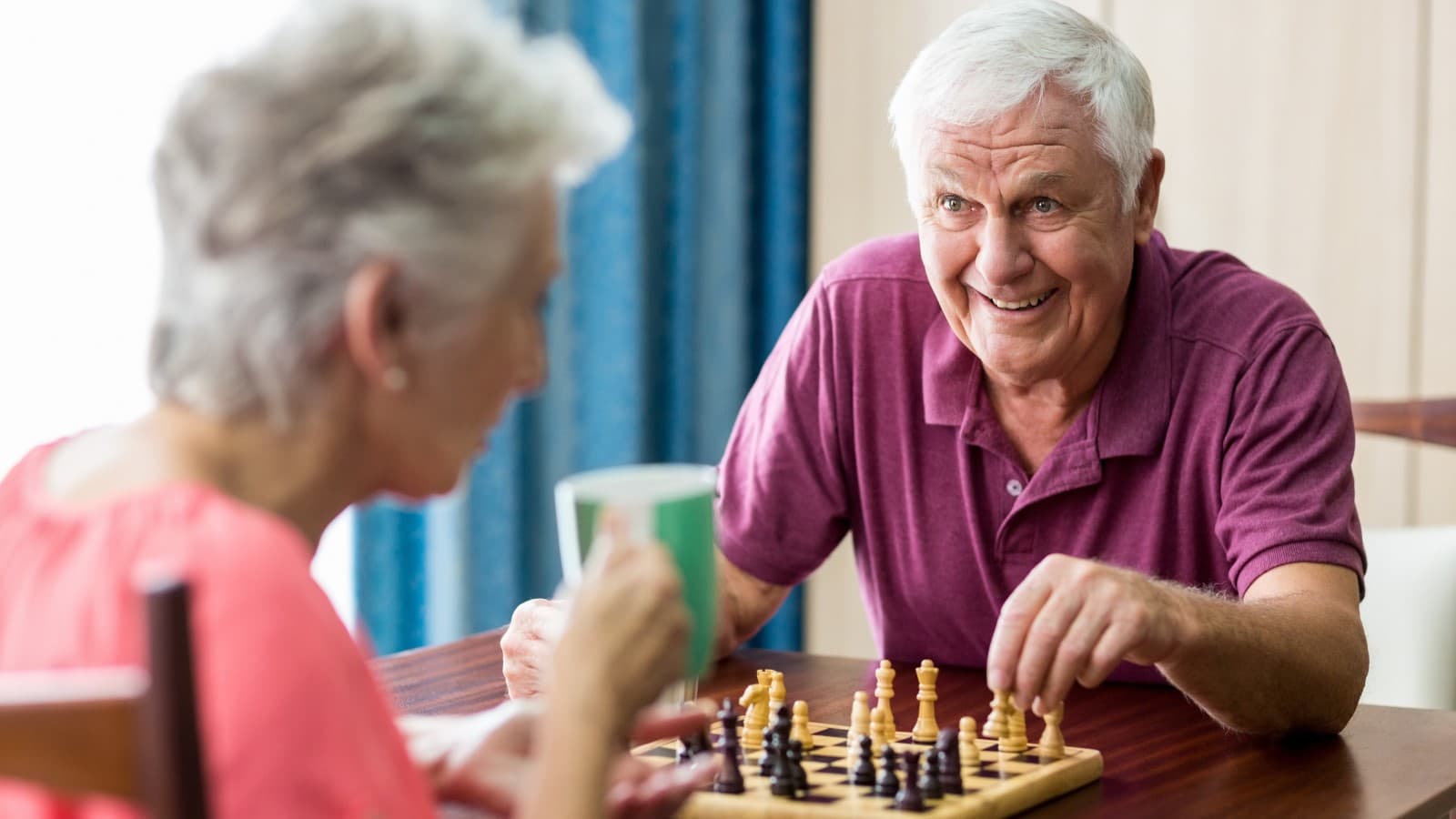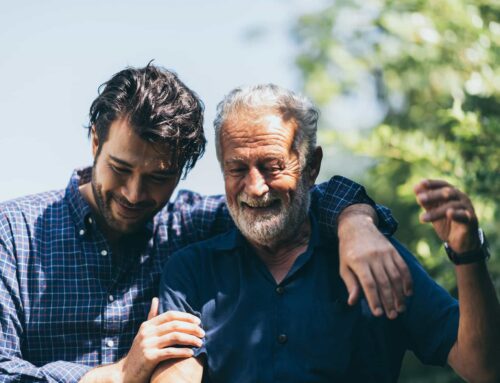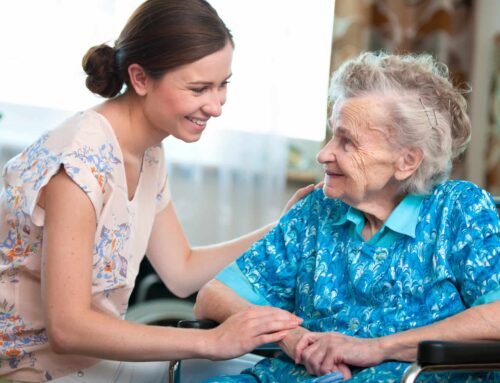There is a direct correlation between aging and mental health. An article from the National Institute on Aging states, “many of us are alone more often than when we were younger, leaving us vulnerable to social isolation and loneliness—and related health problems such as cognitive decline, depression, and heart disease.”
How to Boost Aging and Mental Health Wellbeing
By promoting good mental health in our aging population, we also promote better physical and emotional wellbeing. Here are seven things you can do to keep parents, grandparents, and community elders happy and healthy.
1. Set up regular times to connect
Get your name on their social calendar. As mobility declines and family members spend more time at home, their social world shrinks. Loneliness is a natural outcome, so family members are wise to remain proactive in making loved ones feel wanted, needed, and loved.
Setting up a regular date on the calendar is a beautiful way to do this. If you live nearby, vary that time between sharing meals, playing cards or other games, watching favorite shows together, or getting out around town or enjoying seasonal community activities.
If you live further away, set up regular video chats, Zoom dates, or phone calls. Maybe you can even have a meal together while you’re chatting, which studies show increases a senior’s food intake compared to when they eat alone.
2. Get them digitally connected
Aging family members often relocate to be closer to children and grandchildren. Then there are the millions of adults 65+ who transition into retirement communities, assisted living facilities, or nursing homes. As a result, the retired crowd can wind up feeling separated from their closest friends and loved ones.
Getting a suitable tool in place and familiarizing loved ones with digital connections is a wonderful way to remain in close contact with their friends and social connections. They can also communicate with long-distance family members and grandchildren.
3. Make exercise a regular part of the day
Every human benefits from regular exercise. Daily exercise manages existing health conditions, helps adults reach healthy weight targets, and boosts energy levels and moods.
Daily stretching and a 20 to 30-minute walk are good places to start. You can also look into exercise classes in the community specifically targeted to the 65+ crowd. If your loved one is home- or chair-bound, plenty of exercises are available via YouTube, led by certified professional fitness pros.
In our post, Promoting Physical Activities in Older Adults, we discuss other creative ways to keep moving. These include dancing, gardening, bowling, swimming/water exercises, and prioritizing weekly outings that include movement and walking – such as strolling through museums, art galleries, or botanical gardens.
4. Establish regular sleep patterns
Another benefit to daily movement is it tires the physical body, making it easier to fall asleep at night. Insomnia and other sleep issues like having trouble falling asleep or waking up in the middle of the night and being unable to fall back asleep contribute to fatigue, confusion, and lack of interest in daily activities.
Establishing regular sleep patterns supports a healthy circadian rhythm, proven to decrease or slow down the progression of memory loss. Top recommendations to get a good night’s sleep include:
- Following the sun (getting up with the sun and going to bed after sunset)
- Minimizing artificial light the 30 minutes before bedtime
- Establishing regular wake/sleep times each day
- Limiting intake of stimulants for the few hours before bed (caffeine, alcohol, sugar-laden sweets, etc.)
- Using blackout curtains to eliminate ambient light and using red nightlights which are gentler on the eyes and don’t disrupt the sleep cycle
- Ceasing screen use (including TV) at least 30 minutes before sleeping
- Creating a sleep routine (warm shower or bath, reading or listening to guided relaxation meditations, using soothing essential oils, etc.)
5. Stimulate the brain via games, mental exercises, or creativity
We appreciate this Brain Fitness PDF from Alz.org, which provides top recommendations for keeping the brain active and slows the progression of age-related memory loss, as well as depression and lethargy.
Word searches, crossword puzzles, and card games exercise the brain. Their worksheet also provides a list of free online brain activities and games:
- https://www.braingle.com/
- JigZone.com (online jigsaw puzzles)
- aarp,brainhq.com
If you want to get involved, visit these 145 Trivia Game questions/answers that you and other family members can use to stay in touch and share “Trivia Games of the Day or Week” together.
6. Help them keep a pet
Companionship is essential to health and wellbeing at every age, but it’s particularly important for those who live alone. If your loved one doesn’t have a pet already, think about what type of pet makes the most sense.
For example, dogs require daily feeding and maintenance, whereas a cat does fine with free-feeding/watering dispensers and a litter box as long as it’s checked on two or three times per week. Something as simple as a fish can provide a sense of company and another living creature to connect with. Neighbors and caregivers are always willing to help out if aging loved ones cannot take care of all of the duties on their own.
Also, local shelters always need extra hands. So, an animal-loving parent or grandparent may find they’d rather donate time and volunteer at a shelter once or twice per week, which provides a sense of purpose in their lives.
7. Eating for health and wellbeing
The older a person gets, the more laborious it is to prepare and cook healthy meals. Since a healthy diet is essential for physical and mental wellbeing, nutrition should be a focal point. Prioritize diets that are rich in antioxidants and whole foods, with minimal intake of processed foods.
If loved ones cannot prepare foods for themselves, there are plenty of other options, including meal delivery services or working with in-home care agencies that provide food preparation and meal assistance.
North River Home Care Supports Health & Wellbeing for Aging Adults
The experienced caregivers at North River Home Care are dedicated to supporting aging and mental health for our clients. That includes grocery shopping and healthy meal preparation. We know a healthy diet equals a healthy brain, and eating right starts with following food safety guidelines. Click below to learn more.










